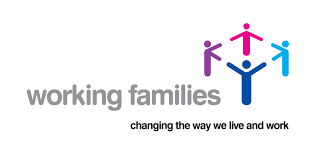
Child Poverty Action Group and Working Families have launched a new project, ‘Britain works’, looking at in-work poverty and how work can be improved for families living on a low income. The polling, on behalf of Britain Works, was conducted by Survation between 14th – 16th September 2017. An online survey was conducted with a sample that included 1,017 parents aged 18+ in the UK, whose household income is less than £30,000 p.a. Data were weighted by housing tenure, number of children and type of family unit. Survation is a member of the British Polling Council and abides by its rules.
+++
Low and middle-income parents want to work, want permanent jobs with a sense of purpose and put a premium on job security - but inadequate pay, a lack of affordable childcare and poor opportunities for progression are holding them back, a survey by Child Poverty Action Group (CPAG) and Working Families finds.
More than two fifths (43%) of part-time workers want to work more hours but are prevented from doing so (see below).
And working parents want permanent jobs (71%).
The UK unemployment rate currently stands at 4.3%, the lowest since 1975 (2).
Key findings:
Struggling families can’t meet costs:
- Almost half (47%) of working parents with an annual household income under £30,000 said they did not have enough money to support their families.
Working parents rate job security as highly as pay:
- Almost three quarters (74%) ranked job security as very important to them, including 36% who gave this the highest possible score of ‘extremely important’. Similarly, 74% cited pay as very important, including 34% who said it was extremely important to them.
- Hours worked in a job are a top priority for 72%, (especially women, 36% of whom gave hours worked a top score, compared to 17% of men).
- A sense of purpose is a top concern for 64%.
- 61% rated flexible working as a top priority.
- Opportunities for career progression were a top priority for half of working parents; but just over one quarter (26%) said their job didn’t offer good opportunities for progression.
Many part time parents want to work more but can’t:
- 43% of parents working part time want to work more hours but can’t. Parenting responsibilities are the biggest reason given for not being able to work more (65%), but the cost of childcare is also a big barrier (ranked high by 61%). 54% said more hours are not available to them and rated this as a major reason.
- Almost one third (32%) of working parents (full and part-time) said they didn’t have enough work to support their family. This was more likely to be true for younger parents (43% of 18-34-year olds, compared to 27% of 35-54-year olds and 9% of those aged over 55).
High childcare costs keep people out of work
- Just over one fifth (21%) of unemployed parents wanted to work but found childcare prohibitively expensive. 16% couldn’t find childcare for the hours they needed.
Becoming a parent jeopardises work progression:
- Parents returning to the workforce after having a child struggle to retain their previous pay level and job grade. Almost half (47%) had to take a salary drop, 43% had to take a lower position and 45% said inflexible hours or work schedules were a problem.
A good work-life balance eludes many parents:
- One third of working parents said they work too much and don’t’ have enough time with family.
- The highest-ranking options for improving the work/life balance of ordinary working families were: security of income (a top three choice for 41%), a higher salary (a top three choice for 58%) and more flexible hours/schedule (a top three choice for 41%).
The survey findings are published to coincide with the launch, by CPAG and Working Families, of Britain Works, a programme of work which aims to inform conversations between both charities and UK employers to identify the solutions that will improve the working lives of the UK’s low and middle-income parents. A Britain Works report (3) on the increasing challenges of work for low-income families is also published today. The report identifies how the world of work is changing and how this is affecting moves into work, progression in work, work-life balance and the rewards from work.
Commenting on the survey findings, Chief Executive of Child Poverty Action Group Alison Garnham, said:
“Our findings show Britain wants to work. Parents are saying they want job security, decent pay and good promotion prospects but too often these elude them. Pay is often low. Extra hours in a job aren’t always there. Childcare costs are sky-high. And too often parents looking to progress in work hit a brick wall.
“We are launching Britain Works to address these problems and want a wide range of employers and parents to get involved. But we also need action from Government. Nearly half of the parents we polled with a household income under £30,000 said they didn’t have enough to support their family. The return of inflation will stretch budgets further . The Chancellor can help in this month’s Budget. A good first step would be to pause and fix universal credit and restore its ability to make work pay for families.”
Commenting on the survey findings, Chief Executive of Working Families Sarah Jackson, said:
“Almost half of the low paid parents in our survey say they don’t have enough money to support their families; and a third of parents we spoke to also say they do not have enough time to spend with them. Clearly work is not a route out of poverty for many families, and can in fact impose a new form of time poverty which prevents families from thriving.
“What’s also clear is that working parents value both job security and work flexibility. We want to encourage employers to join us in thinking differently about work design and flexible hiring, so that they can find not just the right person for the job, but provide the right job for the person. So we can start making work work for everyone.”
Scott Abrahams, senior vice president at Mastercard, who hosted an expert roundtable event to inform the development of the report, said:
“This study reinforces the fact that parents have a huge amount to give businesses around the UK, but in many cases simply aren’t being given the right opportunities or working arrangements. It is important employers look at more ways to support working parents, whether that’s through returnships, flexible working, childcare support or maternity and paternity leave policies, which our employees tell us they really value. By ensuring working parents have the opportunities to succeed, we believe the benefits to business and wider society will be considerable.”
ABC Comment: Below you download the Modern Families Index? The Index was completed by 2,750 parents across the UK in 2016. Responses were gathered online across 11 regions, with 250 responses from each region. The regions covered were: North East, Yorkshire and the Humber, East Midlands, East of England, London, South East, South West, West Midlands, North West, Scotland and Wales. To take part respondents needed to be in paid employment (full or part time) or selfemployed, and to have a dependent child aged 13 or under who lives with them some or all of the time. 54 per cent of respondents had one child under 13, with 33 per cent having two children under 13. The remaining 13 per cent had three or more children under 13. The survey had an almost equal number of respondents by gender. No selection criteria were attached to relationship status, allowing both couple and single parent households to complete the questionnaire.
Leave a comment
Make sure you enter all the required information, indicated by an asterisk (*). HTML code is not allowed.
Join
FREE
Here











